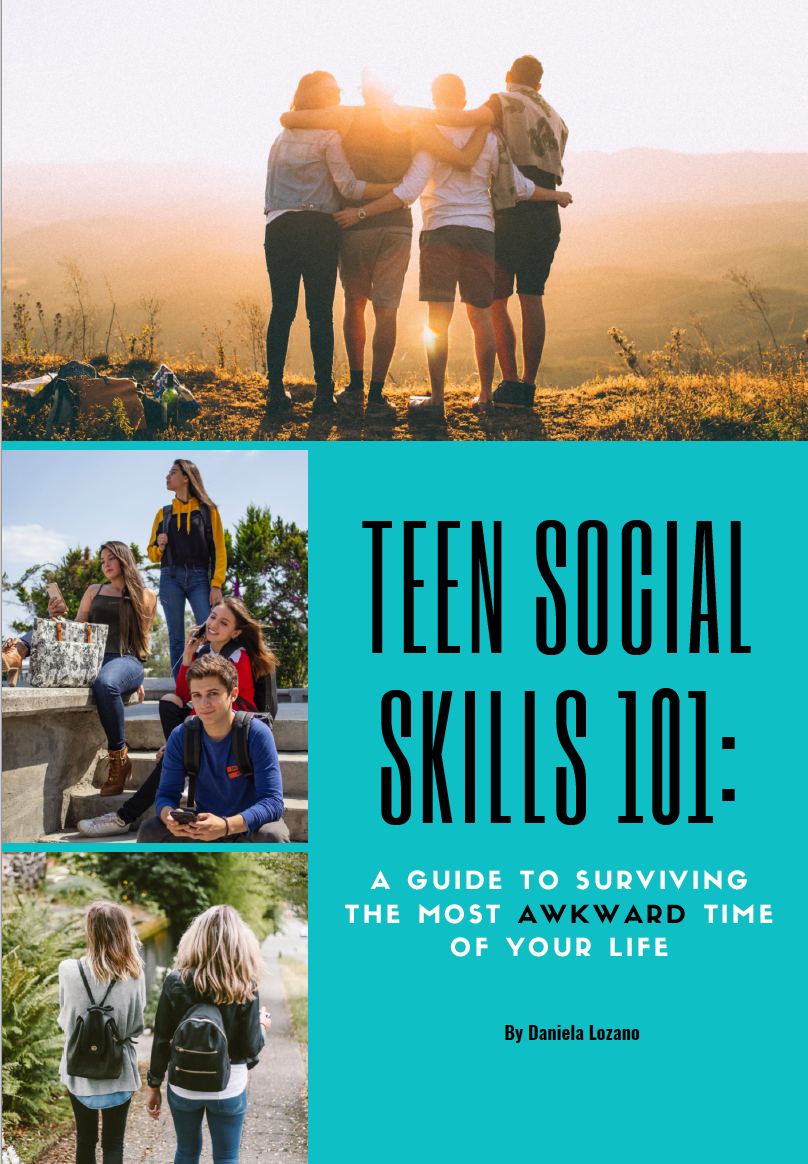Teen Social Skills 101: A Guide to Surviving the Most Awkward Time of Your Life
The other day, I was looking through my old yearbooks and remembering my teenage years. As a teen, I often wondered how to make my life easier. Now, as a college student, I realize all I needed was self-confidence. If confidence is the key to conquering teen life, then social skills are the key to becoming self-confident. Our schools do a good job of academically preparing us. But our schools don’t always teach us the social skills we need to cope with real life problems. We’re taught how to be productive individuals, but not necessarily healthy human beings. If you’re dealing with low self-esteem, fear no more. Here’s your ultimate guide to survive those awkward teen moments:
Awkward Moment #1: Peer Pressure
The desire to fit in can place you in risky situations and bring you a lot of trouble. You might experience peer pressure from a stranger, your crush, and sometimes even from your best friends. The worst part about is that you’re probably doing something illegal. Many teens are influenced to try drugs, alcohol, or tobacco. Some are pressured to get tattoos or piercings. Others are pressured to text inappropriate photos of themselves or to steal from a store. Peer pressure is all about doing something you don’t want to do.
Social Skill: Giving into peer pressure does not make you cool or popular—it just makes you a follower. But being a good influence earns you respect and makes you a leader. Mastering leadership will help you combat peer pressure with confidence. When you guide others to do the right thing, you instantly become a positive role model. Leaders dare to be different and aren’t afraid to stand apart from the crowd. Become someone your peers can admire by having strong principles and values others can’t break. Be firm in your decisions and don’t do anything you’re uncomfortable with. Many people became famous leaders in history by resisting peer pressure and having the courage to say “no.”
Awkward Moment #2: Stage Fright
Stage fright—or performance anxiety—can make you feel like a bug under a microscope. You might experience stomach-turning twists, a cold-sweat breakout, or the need to quickly escape a room. Stage fright can happen when you need to present in front of your classmates, when your teacher chooses you to answer a question, or when you have to schedule appointments over the phone. But stage fright also occurs during nonverbal activities, like competing in a sport or simply walking into the school cafeteria. The result is the same. You feel all of the world’s eyes are on you—waiting for you to make a mistake.
Social Skill: As scary as it might sound, stage fright can only be overcome through more practice with public speaking. Mastering public speaking will not only help you with verbal situations, but also with physical ones that require confident body language. Before performing, take a deep breath, smile, and concentrate on reaching your goal. The key to public speaking is preparation, good posture, proper voice modulation, and being yourself. Start off with baby steps by practicing with your friends or family. The next time you feel embarrassed, remember that the focus of public speaking is always on the audience—not on you. Your audience is rooting for you—not judging you.
Awkward Moment #3: Heartbreak
Relationships can take a huge toll on a teen’s well-being. Romance and falling in love are often rollercoaster experiences with sharp ups and downs. It’s not uncommon for teens to quickly get in and out of relationships. For some, it’s no big deal. But for others, the impact of a break-up can be devastating. Heartbreak isn’t always about a boyfriend or girlfriend. You might also suffer from the end of a close friendship or the death of a loved one. Regardless of the circumstances, heartbreaks can lead to dangerous outcomes such as depression or self-harm.
Social Skill: Embracing adaptability will help you bounce back from any type of heartbreak with confidence. Being adaptable means being able to roll with the punches and accept change for what it is. Staying stuck on ended relationships can destroy you. An adaptable person will know how to let go of harmful feelings and move on with optimism. The key to adaptability is learning how to view situations with neutrality. Don’t take change personally. Become self-aware of when the intensity of your feelings doesn’t match up to the reality of the situation.
Awkward Moment #4: Academic Breakdown
A teen’s schedule is always busy. You might be juggling school, sports, extracurricular activities, family, friends, a part-time job, and a relationship all at the same time. You’re trying to get good grades while dealing with a lot of social drama. Add to this the high expectations your parents, teachers, and society have for you—and the stress of keeping up can lead you to a nervous breakdown. Teens often feel that they’re in a competition against their classmates and even against time. The burden of being the best can quickly drown you into a pool of anxiety.
Social Skill: Using time management, goal-setting, and organizational skills will help you tackle your academic life with confidence. Learn to prioritize the most important activities in your schedule. Eliminate procrastination from your habits. Set your goals into small, measurable steps and give yourself credit each time you accomplish one. Instead of always trying to be No.1—focus on your efforts and improvements—not on perfection. Your mistakes are learning opportunities, not failures. Manage your test anxiety and remember to take breaks to avoid study burnout.
Awkward Moment #5: Catfishing
Social media such as Instagram, Snapchat, Facebook, and Twitter have become necessary parts of a teen’s routine. On its own, social media is not a bad thing. It’s a way for teens to keep up with friends, family, and the world. But when used for the wrong reasons—social media can become a double-edged sword. Catfishing is a slang term for the act of setting up a fake personal profile on social media as a tool of deception. You might have been catfished if you were tricked into an online relationship or trolled by a false identity. Teens are especially vulnerable to online predators who use false information for sinister motives.
Social Skill: Safe social networking skills will help you avoid the dangerous facets of social media with confidence. It’s important to practice common sense and be aware of stranger-danger online. Don’t treat social media like a dating site and always make your profile settings private. Be careful of who you befriend. If someone looks too good to be true, it’s probably because they’re not real. Profiles with only one photo, few followers or friends, and with little to no activity are usually fake. Investigate everything and block any suspicious users if necessary. Never agree to meet with a stranger, alone.
Awkward Moment #6: Bullying
Bullying can take place in many forms—it can be verbal, physical, or cyber. Sometimes it’s even social. Did you know spreading rumors about someone is considered bullying? Getting others to socially exclude someone, in person or online, is another form of bullying. Emotions such as anger, fear, and jealousy are usually at the root of these hurtful acts. These emotions can later lead to more serious problems like violence or suicidal thoughts. So, whether you’re the abuser or the victim—it’s important to know how to stop this nasty situation.
Social Skill: Assertiveness, empathy, and conflict resolution will help you overcome both offline and online bullying with confidence. Assertive teens are neither passive nor aggressive. They defend themselves in a respectful manner without the use of violence. Speak up when you don’t like the way you’re being treated and know when to ask for help. Learn to be aware of others’ thoughts and feelings. Place yourself in their shoes. The key to peaceful conflict resolution is being able to ask questions, listen to others’ opinions, and express your own needs and wants with honesty.
Awkward Moment #7: Body Image
Teens go through various changes with their appearance that can make it difficult for them to feel confident. A combination of hormonal changes, acne, and braces can all contribute to negative body image. It’s not uncommon for teens to constantly compare themselves to others and feel uncomfortable in their own skin. The media often depicts an unrealistic standard of beauty with picture-perfect people. The pressure to be “pretty” or “attractive” can lead to major physical and mental issues. Teen girls might suffer from eating disorders, while boys might become obsessed with getting more muscular.
Social Skill: Positive self-talk, self-compassion, and self-acceptance will help you adjust to your growing body with confidence. Learn to accept yourself as you are and realize that the images you see on TV, magazines, and on the internet are usually photoshopped to hide flaws. Everyone has a different body type, and this is what makes you unique. Be patient and easy with yourself as you go through these changes. Adjust your negative inner thoughts from “I’m so ugly” to more positive ones—like “I’m beautiful inside and out.” Know that you’re not the only teen struggling with body image and reach out for help if your health is in threat.
As a teen, you’re going through a lot of changes that can make your life feel like a constant war zone. But being a teen is also a once-in-a-life-time experience. It’ll soon be over, and you’ll wish you had enjoyed it more instead of focusing on trivial insecurities. Looking back, I wish someone would have told me how to be more self-confident. I was always taught how to be book-smart in school, but not exactly how to be emotionally intelligent. It’s important to seek out learning opportunities outside the traditional classroom. You can’t control what happens in life—but you can control your reaction to it. Social skills can make all the difference between having the best time of your life—or the worst.
The 24/7 Learning Academy offers teen seminars designed to support your emotional growth through social skills’ coaching. We can help you reach your highest potential with the skills not taught at school. So, what are you waiting for? Get out there and conquer your teen battles with self-confidence! Register today at https://247learningacademy.com/teen-seminars.










